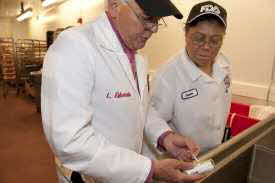FOOD SAFETY MODERNIZATION ACTEarthTalk
E - The Environmental Magazine Dear EarthTalk: What specific issues and protections are covered by the Food Safety Modernization Act recently signed into law?
-- P. Palmerino, New York, NY (3/6/2011) Existing laws and oversight from the U.S. Food and Drug Administration (FDA) have done a decent job of keeping the vast majority of Americans safe from food borne illnesses, but several recent cases of contamination have put the spotlight on what more we can do to protect ourselves from unwittingly consuming harmful bacteria, parasites, viruses and toxins that could be lurking on our dinner plates.
The U.S. Centers for Disease Control (CDC) reports that, of the 48 million Americans afflicted with some sort of food borne illness every year, 128,000 are hospitalized and about 3,000 die. In response to this growing problem, in January 2011 Congress passed and President Obama signed into law the landmark Food Safety Modernization Act (FSMA), a comprehensive $1.4 billion bill that aims to stop outbreaks of food borne illnesses before they begin.  Photo courtesy FDA. Photo courtesy FDA.
Some 48 million Americans are afflicted with a form of food borne illness each year. The Food Safety Modernization Act, signed into law in January 2011, now gives the U.S. Food and Drug Administration wider latitude in protecting our food supply, including the ability to order recalls of tainted foods (previously, the agency could only negotiate with businesses to order voluntary recalls).
|
|
“This law makes everyone responsible and accountable at each step in today's global food supply chain,” reports FDA Commissioner Margaret Hamburg. “This law represents a sea change for food safety in America, bringing a new focus on prevention, and I expect that in the coming years it will have a dramatic and positive effect on the safety of the food supply.” FDA inspectors have monitored domestic producers of seafood, juice, meat, eggs and poultry for decades, but the new law expands their powers to evaluate hazards in all kinds of food and to impose stricter standards on imported foods.
Processors are now required to proactively take measures to prevent contamination, and must have plans in place for corrective action when something does go wrong. Smaller producers are exempt from some of the more onerous and costly provisions of the new law, but are nevertheless still responsible for maintaining the strict health safety standards set forth in its provisions. The new law also increases the number and frequency of inspections at both high-risk and non-high risk facilities. And the FDA can now order recalls of tainted foods; before FSMA’s enactment, the agency could only negotiate with businesses to order voluntary recalls.
Given that some 15 percent of our food supply—including 60 percent of fresh fruits and 80 percent of seafood—is imported, the new law also requires importers to verify the safety of food from their foreign suppliers and authorizes the FDA to block foods from facilities or countries that refuse inspections.
FSMA also provides funds for training, equipment and facilities at food safety agencies across federal, state, local, territorial, tribal and even foreign jurisdictions to ensure that all parties are up to snuff on the ways and means of preventing and containing food borne illnesses.
“Really this is a major victory for every American who will sit down at the dinner table and have more confidence that their food is going to be safe,” says Erik Olson of the Pew Health Group, one the most vocal of hundreds of nonprofits in favor of strengthening our nation’s food safety net. 
CONTACTS: FDA, www.fda.gov; CDC, www.cdc.gov; Pew Health Group, www.pewtrusts.org/our_work_category.aspx?id=184
EarthTalk® is written and edited by Roddy Scheer and Doug Moss and is a registered trademark of E - The Environmental Magazine (www.emagazine.com). Send questions to: earthtalk@emagazine.com . Subscribe: www.emagazine.com/subscribe; Free Trial Issue: www.emagazine.com/trial
| 